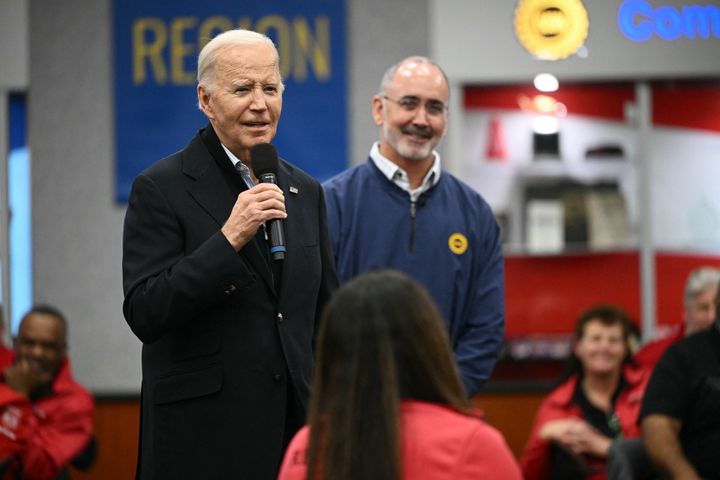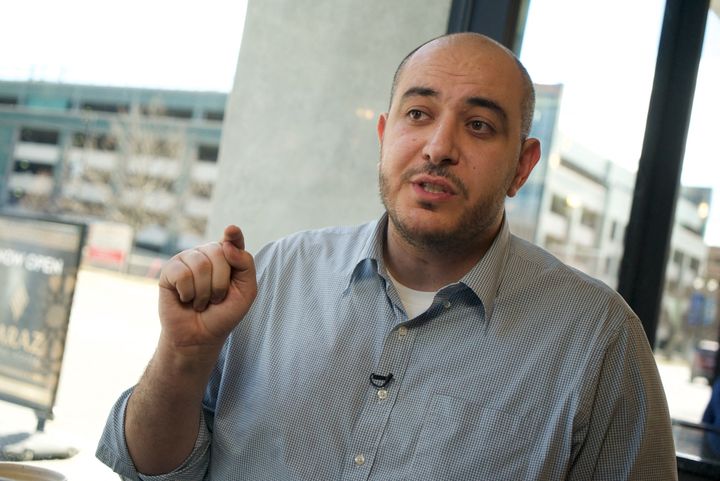
In public comments and ominous polls, the warning signs abound: President Joe Biden’s support for the Israeli invasion of Gaza has cost him deeply among Arab Americans, a critical constituency in Michigan. Given Michigan’s importance as a key swing state, that attrition alone could cost Biden the election.
But with Biden likely to face former President Donald Trump, an Islamophobe, in the general election, Democratic partisans are wondering whether Arab Americans and their progressive allies are really prepared to withhold their votes in protest of Biden’s Israel-Palestine policy.
Community leaders in metropolitan Detroit, including the Arab-American mecca of Dearborn, insist that they are dead serious. Tuesday’s Democratic presidential primary in the Great Lakes State gives these pro-Palestine activists their first chance to prove it.
After considerable deliberation over the best way to make their voices heard, Michigan-based critics of Biden’s unconditional support for Israel settled on a campaign to get people to fill in the “uncommitted” box on the Democratic primary ballot, a unique feature of the midwestern state’s elections.
The Listen to Michigan initiative, a political nonprofit that sprung up earlier this month to spearhead the project, has outlined a goal of exceeding 10,000 “uncommitted” votes — the margin that allowed Trump to carry the state against Hillary Clinton in 2016. (Biden, however, beat Trump by more than 150,000 votes in 2020.)
“We protested. We demonstrated. We wrote to our representatives. We’ve called our representatives. We posted on our social media about this issue in order to hopefully get a permanent cease-fire. We haven’t had that yet,” said Layla Elabed, campaign manager for Listen to Michigan and younger sister to Rep. Rashida Tlaib (D-Mich.), the only Palestinian-American in Congress. “And so now we’re going to the ballot box to tell Biden his core constituency — as 80% of Democrats support a permanent cease-fire — that he needs to listen to us, that he needs to pay attention to us.”

Listen to Michigan has made 100,000 voter contacts by phone, text message, and door knocking, according to Elabed, a longtime progressive community organizer. The initiative also received enough funding to spend $100,000 on a direct mail item and a digital advertisement. And as a testament to the “uncommitted” effort’s appeal beyond the Arab American community, a handful of prominent Black and Latino officials, including Detroit City Council members Mary Waters and Gabriela Santiago-Romero, are backing the bid, alongside the left-wing Jewish groups IfNotNow and Jewish Voice for Peace.
Listen to Michigan’s goal of getting more than 10,000 votes is nonetheless designed to maximize the odds of success by lowering expectations. For context, in 2012, when then-President Barack Obama was running for reelection uncontested, more than 20,000 Democratic primary voters registered their dissatisfaction by voting “uncommitted” — more than 10% of the ballots cast on the Democratic side in the state’s open primaries.
Hussein Dabajeh, a senior aide to Wayne County Commissioner Sam Baydoun and head of his own political consulting firm, set a different marker for success, predicting that there would be between 50,000 and 70,000 people who either cast “uncommitted” ballots or write-in ballots with phrases like “Free Palestine.” In its bilingual campaign literature, the Michigan-based Arab-American Political Action Committee has called upon Michiganders to cast ballots for “anybody but Biden,” which could mean either “uncommitted,” writing in “Free Palestine,” or voting for another Democratic candidate.
“We’d like for Joe Biden to take a look at these numbers and know that Gaza and the Palestinian people, and this genocide that he funded is going to be reason that he loses in November,” said Dabajeh, who clarified that he is supporting Listen to Michigan’s “uncommitted” strategy.
On its website, Listen to Michigan asks potential supporters to sign on by pledging to “let Joe know you don’t stand on the side of genocide.”
More specifically, though, the campaign’s adherents are calling for Biden to get behind a permanent cease-fire ending the Israel-Hamas war in Gaza and to cut off U.S. funding for Israel’s war operations going forward.
“He has failed to differentiate his Israel-Palestine policy from [Israeli Prime Minister Benjamin] Netanyahu’s genocidal agenda.”
- Abbas Alawieh, former senior congressional aide
After the Gaza-based Palestinian militant group Hamas inflicted a brutal attack on Israel on Oct. 7, killing nearly 1,200 Israelis and taking about 250 hostages, Israel responded with a massive aerial bombardment and ground invasion of the besieged Gaza Strip. While Israel says it is targeting Hamas militants operating in underground tunnels, a number of human rights groups maintain that the country has committed war crimes by inflicting collective punishment on the civilian population. Since the start of the war, more than 29,000 Palestinians have died, the vast majority of them women and children. More than 80% of Gaza’s 2.3-million-person population has been displaced by the war and is living in desperate conditions, according to the United Nations.
Last Tuesday, the Biden administration vetoed the third U.N. Security Council resolution demanding a permanent cease-fire. Biden has instead called for a temporary cease-fire, conditioned on Hamas’s release of the remaining 100-plus Israeli hostages, and voiced his opposition to an impending Israeli invasion of Rafah, a city in southern Gaza where 1 million Palestinians have taken refuge.
To American supporters of the Palestinian cause, this latest veto is emblematic of the Biden administration’s approach toward Israel. The Democratic president is willing to express verbal disapproval of Israeli policies but opposes any changes that would put concrete pressure on the country, including by cutting, or placing stricter conditions on, U.S. aid to the nation.
“He has failed to differentiate his Israel-Palestine policy from [Israeli Prime Minister Benjamin] Netanyahu’s genocidal agenda,” said Abbas Allawieh, a Dearborn resident and former senior aide on Capitol Hill, who is a top strategist for the Listen to Michigan movement.
The Biden administration has tried to create some daylight with the Netanyahu government on matters like settlements. On Friday, the administration announced that it was undoing former President Donald Trump’s policy of accepting the “legitimacy” of Israel’s Jewish settlements in the occupied Palestinian territories. And on Feb. 1, the administration placed sanctions on four West Bank settlers accused of attacking Palestinians — a punishment that opens the door for a crackdown on U.S.-based groups that back the settlement enterprise.

On the more timely question of the war in Gaza and the U.S. role in financing it, however, the Biden administration has provided no real policy concessions to Arab Americans and other Democrats who want to see a more balanced U.S. approach in the region.
The White House instead is hoping that more outreach and face time with Arab and Muslim American leaders in Michigan will limit the political fallout. In keeping with that approach, the Biden campaign, which did not comment on this story, has decided against criticizing Listen to Michigan’s “uncommitted” campaign.
“The president, the White House, the campaign — everybody, from what I’ve seen — is taking a very compassionate viewpoint toward those advocating for an ‘uncommitted’ vote,” said Jill Alpert, a Detroit-area Democratic strategist and Biden supporter.
And Biden made a point of condemning a recent Wall Street Journal editorial labeling Dearborn “America’s jihad capital.”
“They’re not waiting for the results of the primary to engage with what is a very important and diverse community,” state Senate Majority Whip Mallory McMorrow, whose 2018 defeat of an incumbent Republican typified the party’s Trump-era gains in suburban Detroit.
But the kerfuffle over a meeting earlier this month between White House officials and Arab American leaders, including Dearborn Mayor Abdullah Hammoud — now a prominent “uncommitted” backer — exemplified the challenges in thinking the problem can be resolved through outreach alone.
Biden’s team initially proffered Biden campaign manager Julie Chavez-Rodriguez as its representative to the meeting, but Hammoud and other leaders rejected it in favor of a White House official, which they got in the form of Jon Finer, Biden’s deputy national security advisor. At the Dearborn meeting, which attracted some demonstrators, Finer apologized for some of Biden’s comments downplaying Palestinian casualties early on in the war while offering little in the way of policy concessions.

“We emphasized that beyond communication, there needs to be a change in policies,” Michigan state Rep. Abraham Aiyash, the majority leader in the Michigan House of Representatives, told The New York Times after the meeting. He also reported that they ruled out another such meeting absent changes.
Meanwhile, though Biden is assured of victory on Tuesday thanks to the absence of credible Democratic primary contenders, the Biden campaign and its allies are downplaying the significance of the race.
“They’re really organizing and looking toward the general election,” Alper said.
At the same time, the campaign sees the Michigan primary, the state’s first major election with early voting and free-postage mail-in ballots, as an opportunity for voter mobilization and organizing. Biden and Vice President Kamala Harris have both made campaign stops in Michigan in the past month.
“He has to do better than Jesus – bring back the people who were killed.”
- Osama Siblani, publisher, The Arab American News
The campaign is also advertising in Michigan, where it is running a one-minute TV spot blasting Trump for disparaging NATO, and has targeted Black voters in the state with radio ads during Black History Month celebrating Biden’s history-making Black cabinet members and other appointments.
Even if the “uncommitted” effort exceeds expectations and Biden underperforms, the impact of such an outcome could be muddied by divisions among Listen to Michigan supporters.
Although all of the Listen to Michigan advocates abhor Trump and foreswore voting for him, the movement’s backers are at odds over what it would take for Biden to win back their votes.
On the one hand, relative moderates see an “uncommitted” vote as a form of tough love intended as a course correction. For example, former Rep. Andy Levin, a Jewish Democrat whose July 2022 primary ouster was bankrolled by pro-Israel groups wary of his support for restricting U.S. aid to Israel, has characterized his “uncommitted” vote as a bid to save Biden from losing. In January, Levin specifically declined pro-Palestine activists’ entreaties to get him to run against Biden because he is “supporting” the president and is “super proud to have served alongside him.”
Elabed, the Listen to Michigan campaign manager, declined to tell HuffPost what conditions would enable her to feel personally comfortable voting for Biden, but she told The New York Times that meeting the movement’s demands— enact a permanent cease-fire and end military aid to Israel as long as the war continues — are “the bare minimum” to win her over.

Many other advocates supportive of Listen to Michigan have further reaching demands, however. Dabajeh will only consider voting for Biden if he succeeds in transforming Israel into a single, binational state with equal rights for all.
Asked whether he’d rule out a vote for Biden in November, Osama Siblani, publisher of The Arab American News, replied, “I never say never.”
“He has to do better than Jesus — bring back the people who were killed,” added Siblani, a self-described “social conservative,” who said that he has voted for Democratic presidential candidates since 2004.
Siblani’s remarks echo what he told HuffPost in late October. “He’s not redeeming himself,” he said of Biden at the time.
Allawieh, who was previously chief of staff to Rep. Cori Bush (D-Mo.), is definitely one of the “uncommitted” voters looking for a path to still support Biden in November. “It’s important to keep Donald Trump as far away from the White House as humanly possible,” he said.
Was it a mistake then for so many Arab American community leaders to sound like they had written Biden off many months ago?
Allawieh chalked up some of the angry rhetoric to the “trauma” that many Arab Americans, who have past experience with Middle Eastern wars or family members affected by Israel’s invasion.
“This is a community that is in deep pain and not only is it in pain, but the feeling of being betrayed by President Biden runs as deep as that pain,” he said. “So we’re constantly here, figuring out both how to survive in what feels like an existential moment, but also try to figure out what the best strategy forward is.”
Disclaimer: The copyright of this article belongs to the original author. Reposting this article is solely for the purpose of information dissemination and does not constitute any investment advice. If there is any infringement, please contact us immediately. We will make corrections or deletions as necessary. Thank you.
